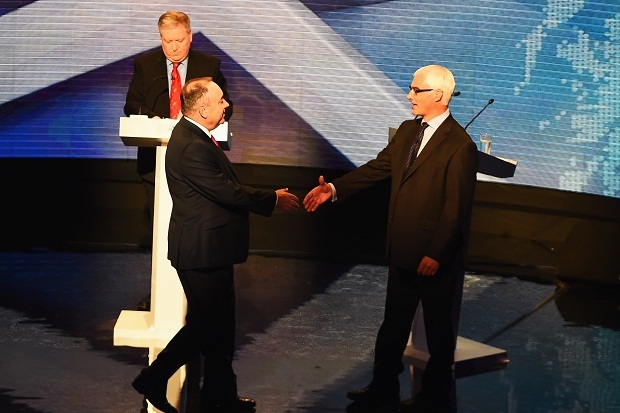Many people, I’m sure, will already be calling the first TV debate in Alistair Darling’s favour. That is a fair point to make but it was not quite as straightforward as that.
I think a truer reflection would be this: Darling won on substance but lost on style, while Alex Salmond won on style but lost on substance. That may seem a bit pedantic, but it matters.
First, the question of style: Salmond was – as we knew he would be – calm, composed and articulate.
Darling was – as many in his camp feared he would be – anxious, shouty and irritable. The former Chancellor looked nervous. He had trouble getting his message across. Indeed, even his eyebrows kept darting up and down as if constantly looking for a way out. In short, he allowed himself to get flustered by the event, by the audience, and by the First Minister who, when he saw Darling starting to get agitated, just smiled and kept on winding him up.
So, if anybody watched the debate with the sound off (and many might well have done given that the STV player was having trouble coping with the online demand) it would have looked like a clear and comfortable victory for the First Minister.
But then we come to substance, and, as has been the case for the whole of the campaign, it all boiled down to the currency.
Darling got his chance in the second section of the two-hour long STV special when he cross-examined Salmond on his plan B, if, as the Treasury has made clear, the UK refuses to share sterling with an independent Scotland.
Darling hammered away at this point. He wouldn’t let it go. Time and again he asked Salmond what his ‘plan B’ was. Each time Salmond refused to answer, Darling went at it again.
Sections of the audience – carefully picked to reflect Yes, No and undecided opinion – started booing and there was nothing Salmond or his supporters could do. He was on the ropes.
Salmond did come back at Darling and made him squirm, but this was simply on whether he agreed with a quote made by David Cameron on Scotland’s ability to be successful as a small, independent country. That wasn’t a game-changing point, but the currency question was.
Overall, voters on both sides will take what they want from it, using the performances of both politicians to justify the decision they have already made.
But this debate wasn’t about them. It was about the 10–15 per cent in the middle who still claim to be undecided, and this is where Darling’s success on the currency, and his win on this most important matter of substance, will be most telling.
The big question hanging over this whole campaign has been Scotland’s currency post-independence, and there can’t have been a single undecided voter who was reassured by the First Minister’s claims on it tonight.
Darling didn’t perform that well. He appeared anxious, flustered and occasionally panicky; but he got over the one key message of the night, and, in a campaign focused as narrowly as this one has been on a small number of key issues, that is going to have an effect.
Darling effectively got Salmond to admit there really is no ‘plan B’ – or, as Darling said towards the end: ‘far too much of this debate has been characterised by guesswork, blind faith and crossed fingers’.
And if – as I suspect – that is the one message undecided voters take from this debate, then in the final analysis, whatever is said by both sides about this particular confrontation, Salmond may well end up losing far more than just a debate.
And so the odds seem to suggest in the aftermath: Ladbrokes reports that the odds on a victory for Salmond’s camp have lengthened to 4/1 from 7/2, with ‘No’ holding fast at 1/6.






Comments